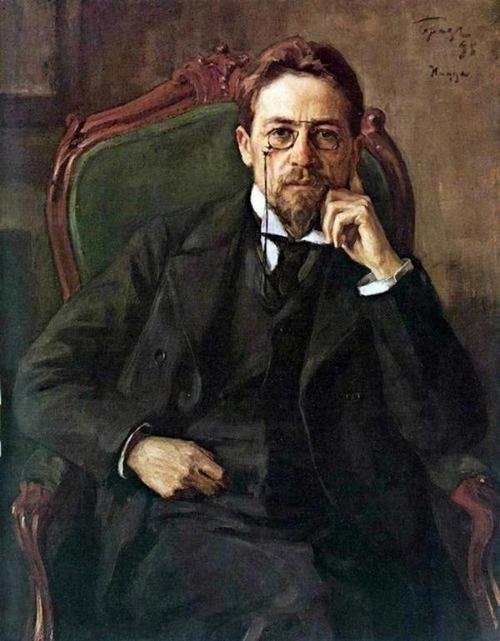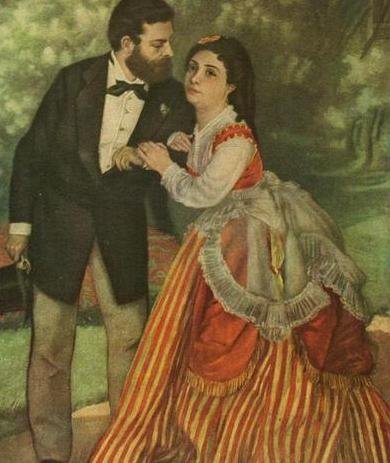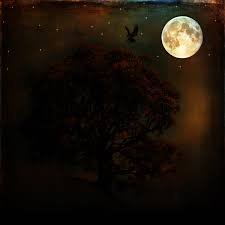ADSactly Literature - Vacationers: a tale by Anton Chekhov

Vacationers: a tale by Anton Chekhov

How the days pass, dear readers. Here I am reading and writing from what I have read. By the way, these days I was reading here an excellent text published by @adsactly and written by @josemalavem that deals with realism. This text reminded me of one of the first writers I read when I began my university career and who left an indelible mark on me: Anton Chekhov.
Anton Chekhov is considered one of the main figures of Russian realism. He was a doctor, writer and playwright, considered one of the most important story writers in the history of literature and an expert in short stories. His texts stand out because they are full of sensitivity and sense of humour, and because the mood of the characters, their psychology, the realistic description of their surroundings, is more important than the plot of the stories. There are many stories, novels and theatre plays that have made Chekhov famous, including The Cherry Garden, The Seagull, Vanka, The Enemy, The Puppy of the Lady, among others. Today we are going to approach his writing through a short story: Vacationers

Vacationers is a simple narration that tells the story of a couple of newlyweds walking through a tourist area. Enthusiastic and happy they find themselves enjoying the atmosphere when the groom's family arrives unexpectedly and all the happiness disappears from the atmosphere. This story, which at first glance can be simple, confronts us with our own pettiness and how hypocritical we can be with some social patterns.
Everything begins when the couple of lovers walk holding hands and the narrator gives us the description of a romantic and idyllic landscape:
Amidst some shreds of clouds, the moon looked and sulked: it probably felt envious and sorry for its boredom and useless virginity. The still air was densely impregnated with the aroma of lilac and wild cherry. On the other side of the rails, the rascon shouted.
The representation given us by the narrator of the moon and his envy makes us see, not only the idyllic of the moment but also the unreal that can be. A moon that is not a companion, but that envies lovers and hides. This is the environment that surrounds the couple as they speak:
How nice, Sasha, how nice! -said the wife. The truth is, everything seems like a dream. Look how cozy and sweet this grove is! What a charm these firm and silent telegraph poles have! They give life to the landscape, Sasha, and they tell us that there are people there, in another place... civilization... Don't you like it when the wind makes the noise of a moving train reach your ears weakly?
As we can see, the conversation revolves around glorifying nature and celebrating everything that surrounds them, from telegraph poles to trains, all seen as distant elements that do not disturb their love. It is as if they are far from the world, far from the rest of people, and their love above all else. In the question that the woman asks her husband, we sense that she feels that the "weak" noise of the moving train is another element that makes them feel far from everything. The moon, like another character, is described by the narrator:
The moon hid behind the cloud, as if it had sniffed snuff. Human happiness reminded him of his solitude, his solitary bed beyond the woods and valleys...
As in the previous description, the moon is humanized. The narrator samples a moon aware of the romantic scene, but very especially, aware of its loneliness. With this representation, we interpreted that the couple looked so happy that even nature envied so much happiness, so much shared love. At that moment, the train arrives and the happy wife points out that the train has arrived and the happy husband tells her:
When the train has passed, we will go home," said Sasha, yawning. "How happy we are, you and I, Varia! So happy, it even seems incredible!
With Sasha's words we sum up that adage that maximum happiness is impossible. He himself doesn't believe that there is so much happiness in them, it's almost impossible. After his words, the travellers begin to leave the train, tired and with their suitcases. At that moment, two girls run out of the train and embrace Varia; also a fat woman accompanied by a skinny man, some children, an governess and the grandmother. The thin man greets Sasha and meanwhile the narrator tells us:

When you see the guy with the whole family, the husbands are horrified. As the uncle talked and kissed them, Sasha's imagination drew the picture: He and his wife would give the guests their three rooms, pillows and blankets...
And Sasha already looks hatefully at his young wife and says in his ear:
It's you they've come to see...bad lightning!
No, you! -These are not my relatives, they are yours!
The unexpected arrival of Sasha's relatives brings to light the pantomime that was the happiness they shared, the ephemeral and false of the full love they professed until now. Sasha imagines everything they have to do to please their families and the discomfort they are going to have as a consequence of that visit, and that bothers him. So he prefers to blame his wife, even though he knows they are his relatives and not hers. And the wife, although she knows the bond that binds them together, affirms that this is not his family but his. The family as the apple of discord, the family as the trigger of anger and fighting between spouses. The family as the only thing we can't save ourselves from, the only thing we can't take vacations from. But even so, in spite of the rage and the inconvenience of having the family at home, the two, hiding their true expression, welcome them:
Behind the cloud once again the moon appeared, floating. She seemed to be smiling; she seemed happy that she had no relatives. Sasha turned his head to hide his angry, desperate face from the guests, and said, striving to give his voice a cheerful and cordial inflection:
Welcome! Welcome, dear guests!

Observe on the one hand Sasha's hypocritical reaction to his relatives, whom he must not only receive but treat with pleasure during his stay; and on the other hand, let us again detail the reaction of the moon, now smiling, perhaps mocking the fate of humans, who have families and must bear it, even in spite of their own happiness. Perhaps from that point of view, loneliness is not so bad, the moon will think.
There are some writers who boast of being difficult, philosophical, theoretical and complex. I have a list of these writers. I return to them, I must say, only out of professional necessity. However, there are other writers who trap you with their readings, that their texts remain as thoughts to which you go not only to quote them but to celebrate them. Anton Chekhov is one of the latter. His texts can be read by anyone, at any time and in the end each reader will feel reflected, identified with what he reads, because although his reference is Russia, in the end he talks about the human being, about what he wants and feels. And in the end, it seems that we all want and feel the same thing.
I hope you liked this Russian writer and want to continue reading his work. Remember that you can vote for @adsactly as a witness and join our server in discord. Until the next smile.

BIBLIOGRAPHIC REFERENCE
Antón Chékhov (1981). First stories (Universal Classics). Barcelona: Planet.
Written by: @nancybriti
Click on the coin to join our Discord Chat

Witness proposal is here:
Go To Steem Witness Page
In the bottom of the page type: adsactly-witness and press vote.

Use small letters and no "@" sign. Or, click here to vote directly!
Thank you!


Certainly, Chekhov is one of those narrators who captivates the attention of a wide group of readers, by his transparent writing, common situations, play with the psychology of characters and readers, even his use of irony. What is clearly manifested in this magnificent tale chosen by you. In it the author displays a certain fantastic game with the inclusion of this humanization of the moon, which you score well.
All of us are exposed in our daily lives to those mishaps, most of them unwanted, that upset our immediate peace or happiness. Chekhov recreates it masterfully.
Thank you for your gratifying post, @nancybriti, and @adsactly for allowing us to enjoy it.
I think that's just one of his skills: to be accessible to all kinds of audiences. To write in a clear and simple way complex subjects is really a virtue. Thank you for always commenting, @josemalavem
great post
Your post is so interesting when reviewing Anton Chekov, the author of realism. we can feel that the words chosen by Anton Chekov are very real. It is far different from the long-winded writer full of figure and impromptu understanding. As you wrote, Anton Chekov wrote to be enjoyed by anyone. When reading, it seemed to be skinning ourselves. And what's great is that he never "says directly about something", but he shows it in reality so that we can feel what he wrote even though he didn't say what he meant.
Likewise we can feel a satire wrapped well in the story. Because we also know that writing can be as sharp as a sword, so it needs to be wrapped in beauty so that when piercing our feelings don't feel too painful. What a great satirical writer.
thank you @nancybriti
Thank you @adsactly
Thank you Steemit
Warm regard from Indonesia
I liked your answer very much, especially the part where you consider that the word is one of the most dangerous weapons that human beings have and that they must know how to use it because with it they can do a lot of damage. Chekhov says a lot, not yet said. Thank you for always commenting, @rokhani
Thanks to his writing inspired by the essay on the realism of @josemalavem, today it is in my memory reviving the work of Antón Chéjov.
Studying the first year of secondary education in the classroom of literature, along with a group of classmates, his play The order of hand, which was the germ for my theatrical hobby that still grows inside me. At that time I gave myself to read his prolific and magnificent work, rightly considered as one of the most important and influential of universal literature.
It is a great contribution that you do, @nancybriti and @josemalavem, when reviewing the work, life and social context of the classic authors so that the new generations have, through them and as far as possible, the opportunity to read in all its dimension the greatness and human fragility.
Thanks, to @adsactly for promoting and to you, @nancybriti for your kindness.
Hi, @adsactly!
You just got a 0.51% upvote from SteemPlus!
To get higher upvotes, earn more SteemPlus Points (SPP). On your Steemit wallet, check your SPP balance and click on "How to earn SPP?" to find out all the ways to earn.
If you're not using SteemPlus yet, please check our last posts in here to see the many ways in which SteemPlus can improve your Steem experience on Steemit and Busy.